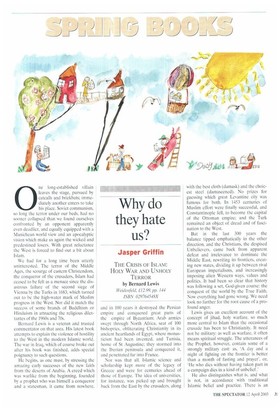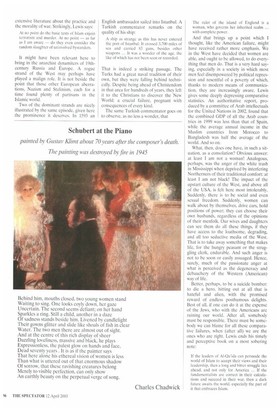Why do they hate us?
Jasper Griffin
THE CRISIS OF ISLAM: HOLY WAR AND UNHOLY TERROR by Bernard Lewis Weide* £12.99, pp. 144 ISBN 029764548X One long-established villain leaves the stage, pursued by catcalls and brickbats; immediately another enters to take his place. Soviet communism, NO long the terror under our beds, had no sooner collapsed than we found ourselves confronted by an opponent apparently even deadlier, and equally equipped with a Manichean world view and an apocalyptic vision which make us again the wicked and predestined losers. With great reluctance the West is forced to find out a bit about Islam.
We had for a long time been utterly uninterested. The terror of the Middle Ages, the scourge of eastern Christendom, the conqueror of the crusaders, Islam had ceased to be felt as a menace since the disastrous failure of the second siege of Vienna by the Turks in 1683, which turned out to be the high-water mark of Muslim progress in the West. Nor did it match the success of some brands of Buddhism or Hinduism in attracting the religious dilettantes of the 1960s and 70s.
Bernard Lewis is a veteran and trusted commentator on that area. His latest book attempts to explain the violence of hostility to the West in the modern Islamic world. The war in Iraq, which of course broke out after his book was finished, adds special poignancy to such questions.
He begins, as one must, by stressing the amazing early successes of the new faith from the deserts of Arabia. A creed which was warlike from the beginning, founded by a prophet who was himself a conqueror and a statesman, it came from nowhere. and in 100 years it destroyed the Persian empire and conquered great parts of the empire of Byzantium; Arab armies swept through North Africa, seat of 100 bishoprics. obliterating Christianity in its ancient heartlands of Egypt, where monasticism had been invented, and Tunisia, home of St Augustine; they stormed into the Iberian peninsula and conquered it, and penetrated far into France.
Nor was that all. Islamic science and scholarship kept more of the legacy of Greece and were for centuries ahead of those of Europe. The idea of universities, for instance, was picked up and brought back from the East by the crusaders, along with the best cloth (damask) and the choicest steel (damascened). No prizes for guessing which great Levantine city was famous for both. In 1453 centuries of Muslim effort were finally successful, and Constantinople fell, to become the capital of the Ottoman empire; and the Turk remained an object of dread and of fascination to the West.
But in the last 300 years the balance tipped emphatically in the other direction, and the Christians, the despised Unbelievers, came back from apparent defeat and irrelevance to dominate the Middle East, rewriting its frontiers, creating new states, dividing it up between rival European imperialisms, and increasingly imposing alien Western ways, values and politics. It had been so clear that history was following a set, God-given course: the conquest of the world by the True Faith. Now everything had gone wrong. We need look no further for the root cause of a profound anger.
Lewis gives an excellent account of the concept of jihad, holy warfare, so much more central to Islam than the occasional crusade has been to Christianity. It need not be military: as well as warfare, it often means spiritual struggle. The utterances of the Prophet, however, contain some of a strongly military cast: as, 'A day and a night of fighting on the frontier is better than a month of fasting and prayer', or. 'He who dies without having taken part in a campaign dies in a kind of unbelief,' He also distinguishes what is, and what is not, in accordance with traditional Islamic belief and practice. There is an extensive literature about the practice and the morality of war. Strikingly, Lewis says:
At no point do the basic texts of Islam enjoin terrorism and murder. At no point — as far as I am aware — do they even consider the random slaughter of uninvolved bystanders.
It might have been relevant here to bring in the anarchist dynamiters of 19thcentury Russia and Europe. A rogue strand of the West may perhaps have played a malign role. It is not beside the point that those other European aberrations, Nazism and Stalinism, each for a time found plenty of partisans in the Islamic world.
Two of the dominant strands are nicely illustrated by the same episode, given here the prominence it deserves. In 1593 an English ambassador sailed into Istanbul. A Turkish commentator remarks on the quality of his ship:
A ship as strange as this has never entered the port of Istanbul. It crossed 3,700 miles of sea and carried 83 guns, besides other weapons It was a wonder of the age, the like of which has not been seen or recorded.
That is indeed a striking passage. The Turks had a great naval tradition of their own, but they were falling behind technically. Despite being ahead of Christendom in that area for hundreds of years, they left it to the Christians to discover the New World: a crucial failure, pregnant with consequences of every kind.
The same Turkish commentator goes on to observe, as no less a wonder, that
The ruler of the island of England is a woman, who governs her inherited realm ... with complete power.
And that brings up a point which I thought, like the American failure, might have received rather more emphasis. We in the West have decided that women are able, and ought to be allowed, to do everything that men do. That is a very hard saying, especially in a society in which most men feel disempowered by political repression and resentful of a poverty of which, thanks to modern means of communication, they are increasingly aware. Lewis gives some deeply depressing comparative statistics. An authoritative report, produced by a committee of Arab intellectuals for the United Nations in 2002, found that the combined GDP of all the Arab countries in 1999 was less than that of Spain, while the average annual income in the Muslim countries from Morocco to Bangladesh was half the average of the world. And so on.
What, then, does one have, in such a situation, as a consolation? Obvious answer: at least I am not a woman! Analogous, perhaps, was the anger of the white trash in Mississippi when deprived by interfering Northerners of their traditional comfort: at least I am not black! The impact of the upstart culture of the West, and above all of the USA, is felt here most intolerably. Suddenly, there is to be social and even sexual freedom. Suddenly, women can walk about by themselves, drive cars, hold positions of power; they can choose their own husbands, regardless of the opinions of their menfolk. Our wives and daughters can see them do all these things, if they have access to the loathsome, degrading, and all too seductive media of the West. That is to take away something that makes life, for the hungry peasant or the struggling clerk, endurable. And such anger is not to be soon or easily assuaged. Hence, surely, much of the passionate anger at what is perceived as the degeneracy and debauchery of the Western (American) way of life.
Better, perhaps, to be a suicide bomber: to die a hero, hitting out at all that is hateful and alien, with the promised reward of endless posthumous delights. Best of all, if one can do it at the expense of the Jews, who with the Americans are ruining our world. After all, somebody must be responsible. There must be somebody we can blame for all these comparative failures, when (after all) we are the ones who are right. Lewis ends his timely and perceptive book on a most sobering note:
If the leaders of Al-Oa'ida can persuade the world of Islam to accept their views and their leadership, then a long and bitter struggle lies ahead, and not only for America ... If the fundamentalists are correct in their calculations and succeed in their war, then a dark future awaits the world, especially the part of it that embraces Islam.



































































 Previous page
Previous page